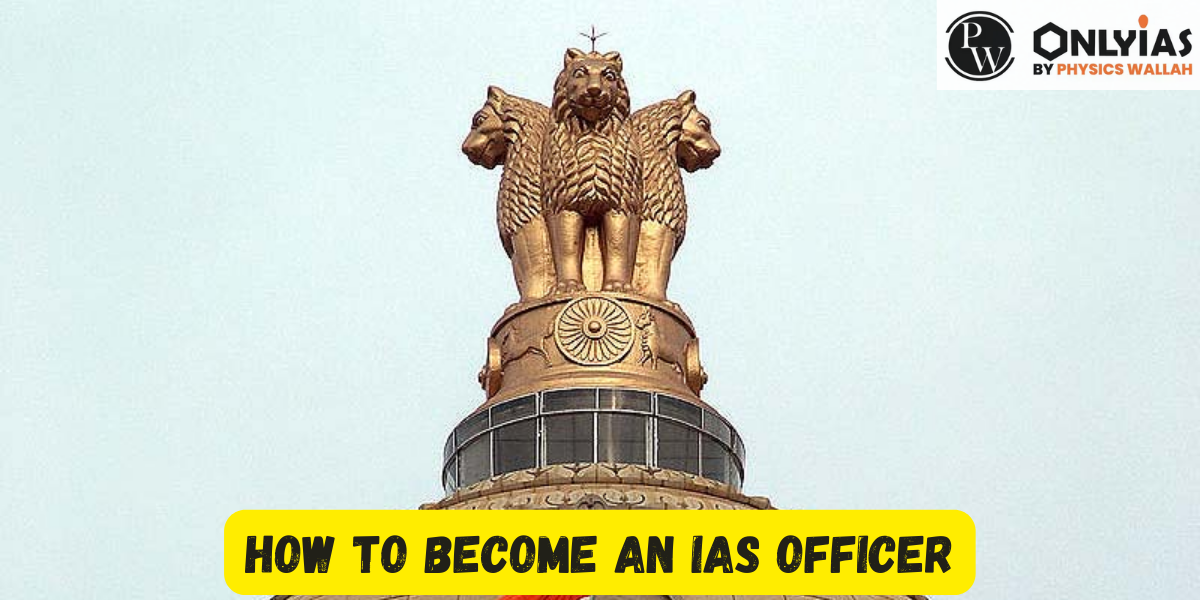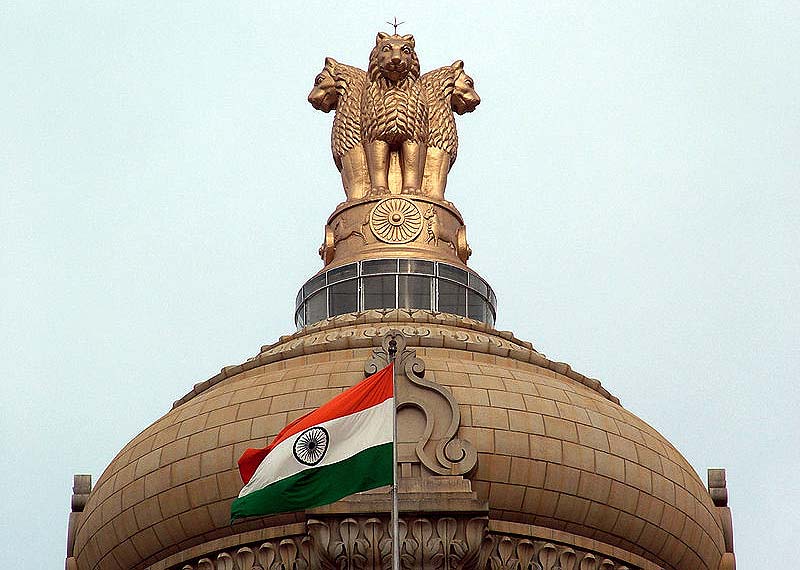![]() Madhavi Gaur
Madhavi Gaur
![]() August 18, 2023 06:10
August 18, 2023 06:10
![]() 4159
4159
![]() 0
0

How to Become an IAS Officer? is a primary inquiry for students who opt to prepare for the UPSC Examination. Regarded as one of the most challenging assessments in India, the Civil Services Examination is administered by the UPSC and encompasses three distinct stages: Prelims, Mains, and Interviews.
The Indian Administrative Service (IAS) constitutes one of the three pivotal branches of the All India Services, alongside the Indian Police Service and the Indian Forest Service. As an integral component of India’s enduring bureaucracy, the IAS holds an indispensable role within the Executive. This article will center on addressing the pathway to becoming an IAS Officer, accompanied by a systematic approach to preparation.

Becoming an IAS Officer necessitates successfully clearing the UPSC Examination, which comprises three phases: UPSC Prelims, Mains, and Interview. Service allocation to the IAS is determined by category reservations set for the respective year.
The journey toward becoming an IAS Officer commences with a comprehensive study of the UPSC Syllabus. While the Prelims and Mains Syllabus are interconnected, they demand distinct approaches to preparation.
Embarking on the path to becoming an IAS Officer after completing the 12th grade commences with a foundational understanding of the NCERT Books for UPSC. These books constitute the bedrock of preparation for several subjects within the UPSC Preparation Strategy. When studying NCERTs for the UPSC exam, it is advisable to progress sequentially from the 6th-grade level to the 12th-grade level.
Although the NCERT Books do not encompass the entire civil service syllabus, they do encompass a substantial portion of the essential concepts and principles.
After successfully completing the intermediate level or 12th grade, aspiring candidates should determine their preferred optional subject. Consult the UPSC’s List of Optional Subjects and pursue a graduation degree in that chosen field. Even if your undergraduate specialization isn’t in the humanities, you can still cultivate a habit of reading books related to your chosen optional subject during your college years.
Sequential Approach The journey to becoming an IAS Officer demands unwavering determination, persistence, and a willingness to put in relentless effort, even in the face of challenging circumstances. The IAS Examination imparts valuable lessons in patience and underscores the significance of both hard work and strategic effort.
An effective and comprehensive UPSC Preparation Strategy is pivotal for realizing the goal of becoming an IAS Officer. Below, we will outline the sequential steps that a committed aspirant should embrace to attain success. These step-by-step guidelines encompass:
Understanding the Role of an IAS Officer
Before delving into the process of becoming an IAS officer, it’s essential to understand the responsibilities and role that comes with this esteemed position. IAS officers play a vital role in the administration of the country, from formulating and implementing policies to managing public resources, and ensuring efficient governance at the grassroots level. Their impact is felt across various sectors, from health and education to infrastructure and law enforcement.
Educational Qualifications and Eligibility
To embark on the path to becoming an IAS officer, candidates must meet certain educational qualifications and eligibility criteria. The foremost requirement is a bachelor’s degree from a recognized university. Candidates from diverse academic backgrounds, including arts, sciences, engineering, and humanities, are eligible to apply.
It’s important to note that candidates awaiting the results of their final year exams for the bachelor’s degree can also apply. However, they must provide proof of passing before the main examination of the UPSC (Union Public Service Commission).
The UPSC Civil Services Examination
The UPSC Civil Services Examination is the gateway to becoming an IAS officer. This highly competitive and rigorous examination is conducted in three stages:
Selecting the Right Optional Subject
Choosing the right optional subject is a crucial decision that can significantly impact a candidate’s performance in the Mains examination. Candidates have a wide array of subjects to choose from, including history, political science, geography, economics, public administration, and more. Opting for a subject that aligns with one’s strengths and interests, while also considering overlapping with the general studies syllabus, can give candidates a strategic advantage.
Preparation Strategy and Resources
Preparing for the UPSC examination requires a well-structured and disciplined approach. Aspirants should focus on developing a strong foundation in the subjects covered in the Prelims and Mains. This involves regular study, practice, and staying updated with current affairs. Joining reputable coaching institutes, attending online webinars, participating in mock tests, and referring to quality study materials can enhance the preparation process.
Establish a Strong Foundation
For those aspiring to become IAS Officers, a solid grasp of the fundamentals and a clear understanding of the syllabus are imperative. It is advisable to thoroughly acquaint oneself with the comprehensive UPSC Syllabus before embarking on the preparation journey.
Educational Material and Select Foundational Literature
Upon gaining familiarity with the syllabus, progress to the next phase, involving educational resources. Aspiring candidates should delve into the NCERT Books for UPSC, revisiting them meticulously through multiple iterations before the exam. After completing the NCERT Books, transition to the recommended standard UPSC Books for all stipulated subjects. While studying, meticulous note-taking aids in facilitating efficient revision during critical junctures.
UPSC Question Papers
The utilization of UPSC Previous Year Question Papers provides invaluable conceptual clarity regarding the intricacies of the IAS Exam and its difficulty level. Solving these question papers not only enhances time management skills but also offers insights into key focus areas essential for successfully navigating the UPSC Exam.
Prioritize Current Affairs
A firm grasp of current affairs is indispensable to excel in the Civil Service Examination. The paramount importance of current affairs is evident in its integral role within the preparation process. Developing a foundational understanding and conceptual insight into both national and international news events is essential for optimal performance. Prioritizing quality over quantity is recommended, with potential news sources such as The Hindu or The Indian Express.
Mock Assessments
Timely engagement with IAS mock tests serves as an invaluable tool for assessing an aspiring IAS officer’s progress. Regularly attempt sectional, comprehensive, and full-length mock assessments to gauge performance and identify areas requiring further refinement. You can join PWonlyIAS mock test for better assessment of your UPSC preparation.
Time Management and Revision
Time management is paramount when preparing for the UPSC examination. Creating a study schedule that allocates sufficient time for each subject and topic is essential. Additionally, setting aside dedicated time for revision is crucial to reinforce concepts and improve retention. Regular revision ensures that the information stays fresh in the candidate’s mind during the examination.
Developing Writing Skills
The Mains examination involves descriptive answers and essay writing. Developing strong writing skills is essential to effectively convey thoughts, ideas, and arguments. Aspirants should practice writing answers and essays regularly, focusing on clarity, coherence, and structure.
Physical and Mental Fitness
Becoming an IAS officer demands not only intellectual prowess but also physical and mental fitness. Engaging in regular physical activity, maintaining a healthy lifestyle, and managing stress are integral to performing well in the examination and subsequent duties as an IAS officer.
Becoming an IAS Officer entails the initial step of filling out the application form, an annual procedure conducted by the UPSC. The UPSC releases the IAS application form yearly, and aspirants interested in the IAS 2023 examination can complete the form on the official website. It is advisable to thoroughly review all necessary information before proceeding with the online Prelims exam form submission.
To complete the IAS Officer Form online, follow these instructions:
Qualifying as an IAS Officer entails participation in the UPSC Exam, encompassing three stages: Prelims, Mains, and Interview. Failure at any stage results in restarting the process. The Prelims consist of two objective MCQ papers (General Studies and CSAT), with a maximum score of 400 points (200 each). The Prelims serve as a screening phase, with scores not influencing the candidate’s final rank.
Approximately twelve to thirteen times the estimated number of vacancies are selected for the UPSC Mains Exam from the Prelims qualifiers. Only candidates declared qualified by the Commission for the Prelims proceed to the UPSC Mains examination.
For the UPSC Interview, two to three times the allotted number of vacancies are summoned. The commission determines the vacancies to be filled, selecting candidates deemed suitable for joining Central Group A and B services.
Upon the declaration of UPSC Results and the release of UPSC Cut off scores, successful candidates are summoned for training at various centers nationwide. The foundation course training is uniform across all services, including IAS, IPS, IFS, IRS, IFoS, and others, conducted at LBSNAA.
LBSNAA, the National Academy of Administration, is responsible for training IAS recruits. Job-specific training (Phase 1 and Phase 2) for IAS Officers, along with the Bharat Darshan, commences at LBSNAA.
The duties of an IAS Officer in India encompass:
Becoming an IAS officer is a journey that requires dedication, perseverance, and continuous learning. The process involves rigorous preparation, thorough understanding of subjects, and the development of various skills. Aspiring candidates should approach the journey with determination, stay focused on their goals, and continuously strive for excellence. The role of an IAS officer is not only a prestigious position but also a significant opportunity to contribute to the development and welfare of the nation.

<div class="new-fform">
</div>

Latest Comments